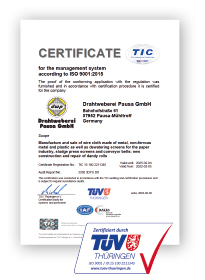Types of weaves
 |
PLAIN WEAVE
The most popular weave. Each weft wire passes alternately over and under each warp wire, and each warp wire passes alternately over and under each weft wire. Warp and weft wire diameters are generally the same.
|
 |
PLAIN DUTCH WEAVE, also called HOLLANDER
While the warp wires remain straight, the weft wires are plain woven to lie as close as possible against each other in a plain weave forming a dense strong material with small, irregular and twisting passageways that appear triangular when diagonally viewing the weave.
|
 |
REVERSE DUTCH WEAVE
This is the reverse of the Plain Dutch Weave, in that the weft wires are heavier than the warp wires
|
 |
TWILL WEAVE
Each weft wire alternately passes over two, then under two successive warp wires and each warp wire passes alternately over two and under two successive weft wires, in a staggered arrangement. Twill weave is normally used to allow a heavier than standard wire diameter in association with a given mesh.
|
 |
DUTCH TWILL WEAVE
Similar to Plain Dutch Weave, except that the weave is twilled, allowing a double layer of weft wires. There are no apertures in the true sense of the word as the filtrate follows a sinuous path trough the depth of the wire cloth.
|
 |
REVERSE DUTCH TWILL WEAVE
The warp wires are very similar to the Reverse Dutch Weave but the weft wires are being woven in a twilled construction.
|
materials: stainless steel, bright steel, galvanised steel, copper, brass, phosphor bronze, special alloys, polyester
aperture width: 0.003 mm - 10 mm (other dimensions on request)
weaving width: up to 6000 mm
supplied in rolls or cut pieces











